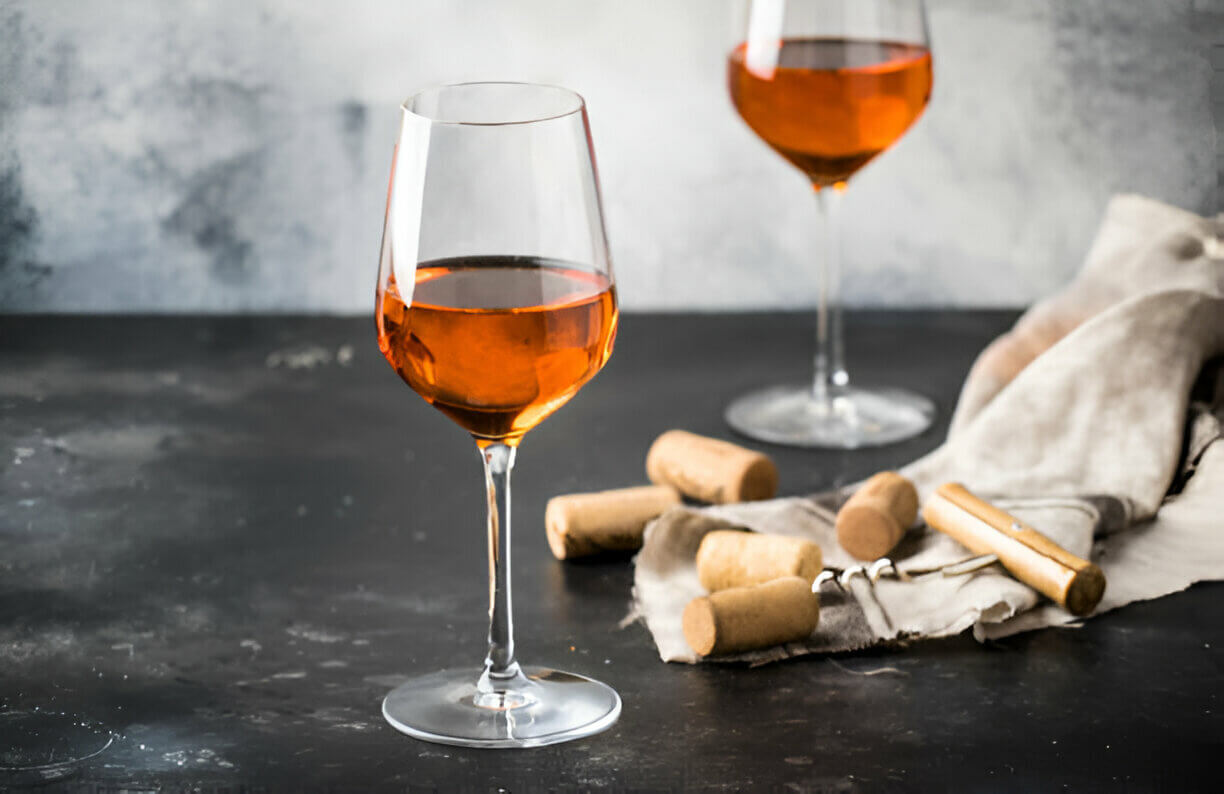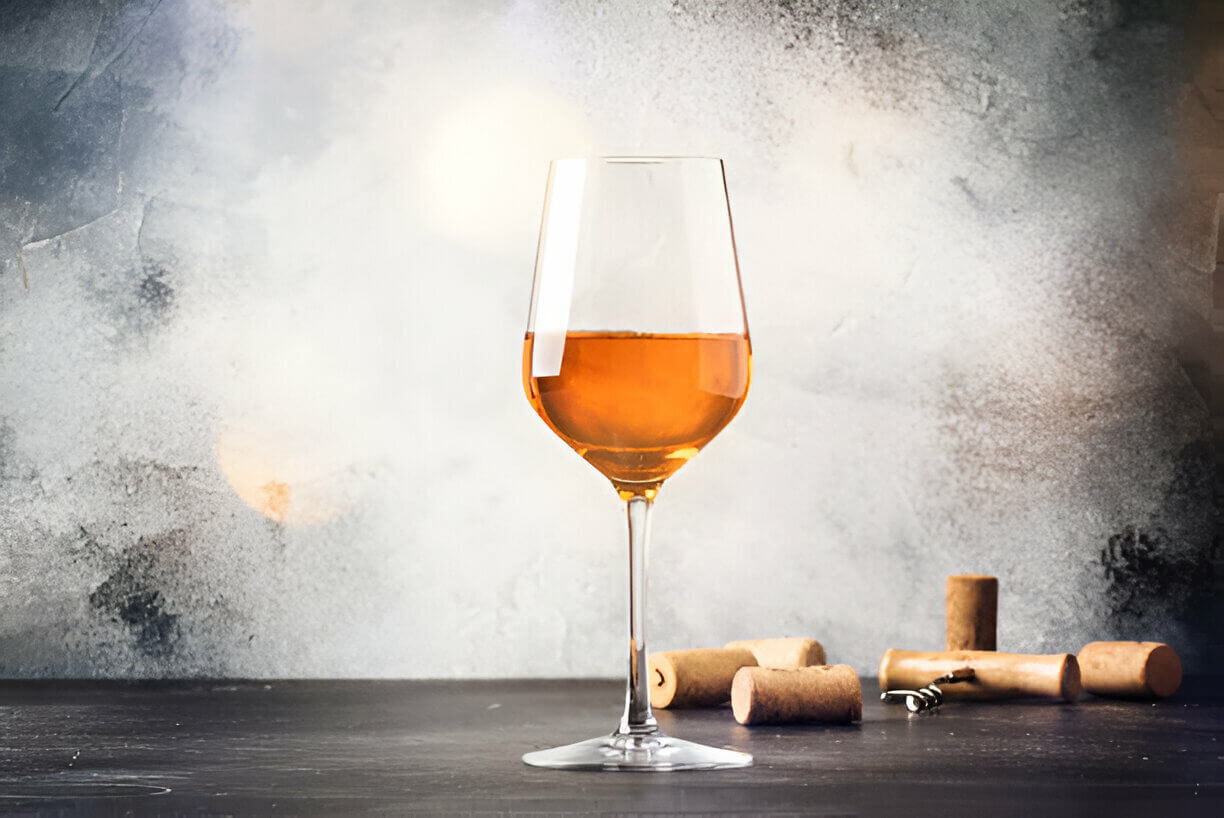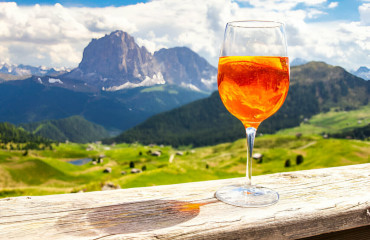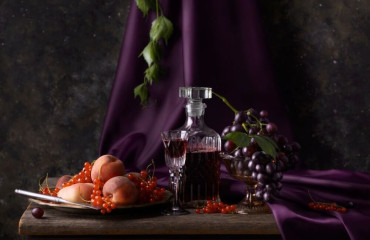Orange wines are a special type of wine made from white grapes but using methods traditionally associated with red wines. This gives the wine an unusual color and aroma. Orange wine pairs well with various dishes and can be an interesting addition to the table. Of course, you don't need to know everything about wine to enjoy it, but if you're a true connoisseur, you'll find it intriguing. It's possible you didn't even know such wine existed if you haven't been to regions known for winemaking, such as Georgia, Italy, or France. Let's dive into this a bit more.
Where does the name "orange wine" come from?
The name "orange wine" comes from the characteristic amber or pinkish-orange hue that the wine acquires as a result of the grape juice's contact with the skins of white grapes during fermentation. This process, during which grape skins remain in contact with the juice for several days or even months, not only imparts a specific color to the wine but also richer tannins (which affect the taste) and a complex aroma.
The term "orange wine" itself was coined by the British wine importer David Harvey in 2004. However, the production method of such wines dates back millennia, with its origins in Georgia, where the traditional method of fermentation in qvevri - large clay vessels buried in the ground - is used. An interesting fact is that Georgian wine produced using this technology is considered the world's first.
Tasting characteristics
Orange wine is known for its rich and complex flavor profile, which significantly differs from more traditional white or red wines. Thanks to the maceration method, in which grape juice contacts the skins, orange wines acquire pronounced tannins and phenolic compounds, giving them a unique structure and depth of flavor. Typical aromas include notes of dried fruits such as apricot and fig, as well as hints of nuts, honey, and herbs. The taste can vary from brightly expressed acidic and dry to slightly sweet and fruity tones.
Especially intriguing in this regard are the orange wines of Georgia, where traditional production in qvevri gives them unique earthy and mineral notes, making each sip even more rich and memorable.

What to serve with orange wine?
Orange wine from Georgia pairs excellently with many dishes from both Georgian and European cuisines, as well as others. Speaking of Georgian cuisine, dishes like khachapuri, chakhokhbili, or satsivi come to mind. Additionally, it complements dishes from Mediterranean cuisine, including seafood, hard cheeses, and mushroom-based dishes.
The Georgian cuisine restaurant RadioCafe offers special conditions: with the purchase of any bottle of wine, a wine board is given as a gift. This ongoing promotion allows guests to enjoy exquisite wine and appetizer pairings without time constraints.
Who invented orange wine?
It's difficult to pinpoint the exact "inventor" of orange wine because this winemaking method has ancient roots. Orange wines are produced using an ancient method that originated in Georgia over 8,000 years ago. Georgia is considered the birthplace of this unique winemaking technique, where wines were fermented in large clay vessels called qvevri, buried in the ground. This method allowed grape juice to remain in contact with the skins for a long time, giving the wine its characteristic orange color.
Initially, orange wine was not distinguished as a separate category, and only recently, in the early 21st century, due to the interest of Western winemakers and wine experts, did orange wines begin to gain popularity internationally.
How is orange wine typically made?
Orange wine is traditionally made from white grape varieties but using methods characteristic of red wine. This process involves prolonged contact of the juice with grape skins and sometimes seeds, which gives the wine its unique color and heavier flavor profile.
First, the grapes are carefully selected and harvested, then crushed and placed into fermentation vessels, such as stainless steel tanks, wooden barrels, or traditional clay vessels known as qvevri, which are particularly popular in Georgia. During fermentation, which can last from several days to several months, grape skins remain in contact with the juice, enriching it with tannins and phenolic compounds, making the wine more structured and aromatic.
After fermentation, the wine may undergo aging, which also influences its final taste. The wine is then filtered and bottled for further sale or aging. The entire process makes orange wine truly unique, with a pronounced taste and aroma that sets it apart from more traditional white and red wines.

Tips for choosing and purchasing
When choosing orange wine, it's important to pay attention to several key aspects:
- Region of origin. Well-known regions such as Friuli-Venezia Giulia in Italy and Georgia are renowned for their high-quality orange wines. These regions have a long history of orange wine production, and wines from there are often considered a reliable choice.
- Producer. Look for wines from reputable producers known for their quality. Some well-known producers of orange wines include Josko Gravner and Radikon in Italy.
- Grape variety and style. Different grape varieties offer different flavor profiles. For example, wines made from Ribolla Gialla often have brighter, fruity notes, while those made from Pinot Gris may be more delicate and elegant.
- Vintage. The harvest year can greatly affect the wine's characteristics. Good years will provide wine with better aging potential and flavor development.
- Production methods. Wines produced with minimal intervention and using traditional methods are often highly valued for their authenticity and complex flavors.
- Reviews and ratings. Searching for reviews and ratings online can help determine the quality of the wine before purchasing.
Choosing orange wine can be an exciting way to explore a variety of flavors and styles.
Most popular amber wines in Georgia
Too much has been said "in general," let's talk about something specific - the most popular amber wines in Georgia, which are a subtype of orange wines:
- Rkatsiteli. Rkatsiteli is a Georgian amber wine made from the eponymous grape variety, known for its ability to withstand cold temperatures and maintain high acidity. The wine has a rich amber color with aromas of roasted orange, ginger, bitter almond, and peach, making it an excellent choice to pair with meat and cheese dishes.
- Kisi. Amber wine from Kisi is known for its complex aromas and long finish.
- Khikhvi. Made from the grape variety of the same name, Khikhvi shares characteristics similar to Rkatsiteli, with pronounced tannins and a complex bouquet.
- Tsitska and Tsolikauri. These wines are table wines, quite light, with a complex taste.
- Tibaani. Wine made from Rkatsiteli grape and various green grape varieties. It has a light aroma of raisins.
- Kardenakhi. A fairly strong wine (18%), with a light honey flavor.
- Chinuri. Amber wine from Chinuri is known for its complex aromas and long finish.
These amber wines represent a unique combination of traditional winemaking and local grape varieties, each reflecting the characteristics of its region and its winemaking history.





